News
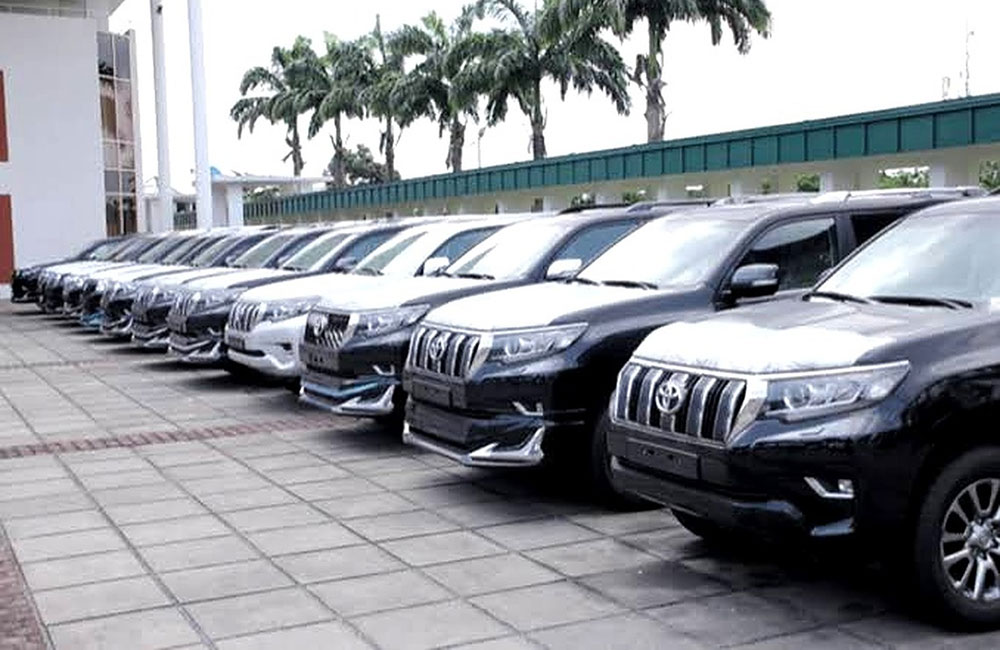
Government Vehicles Could Run Three Times Cheaper, Report
Government vehicles running at a cost of Rs. 300 per kilometer can be run at the cost of Rs. 100 - Revealed in the Sectoral Oversight Committee on Energy and Transport.
Government vehicles which are running at a cost of Rs. 300 per kilometer can be run at a cost of 100, revealed in the Sectoral Oversight Committee on Energy and Transport recently.
The above was revealed according to the data of a research paper prepared by the Department of Manpower and Employment on "Public Resource Management" which was presented at the Sectoral Oversight Committee on Energy and Transport.
Here, the relevant research paper indicated that according to the statistics of the year 2022, government institutions own about 82,000 vehicles, of which about 76,000 are in running condition and around 5500 vehicles are not in running condition.
According to this research paper, it was identified that the cost of driving one kilometer of a vehicle in running condition is approximately between Rs. 300 and Rs.500.
The research shows that it was identified that if these vehicles required by government institutions are hired from the private sector on a rent or lease basis, it is possible to run a kilometer with Rs. 100 or less amount.
Thus, if this process is followed by removing the state-owned vehicles atomically, it was revealed that about 20 billion rupees government expenditure can be saved.
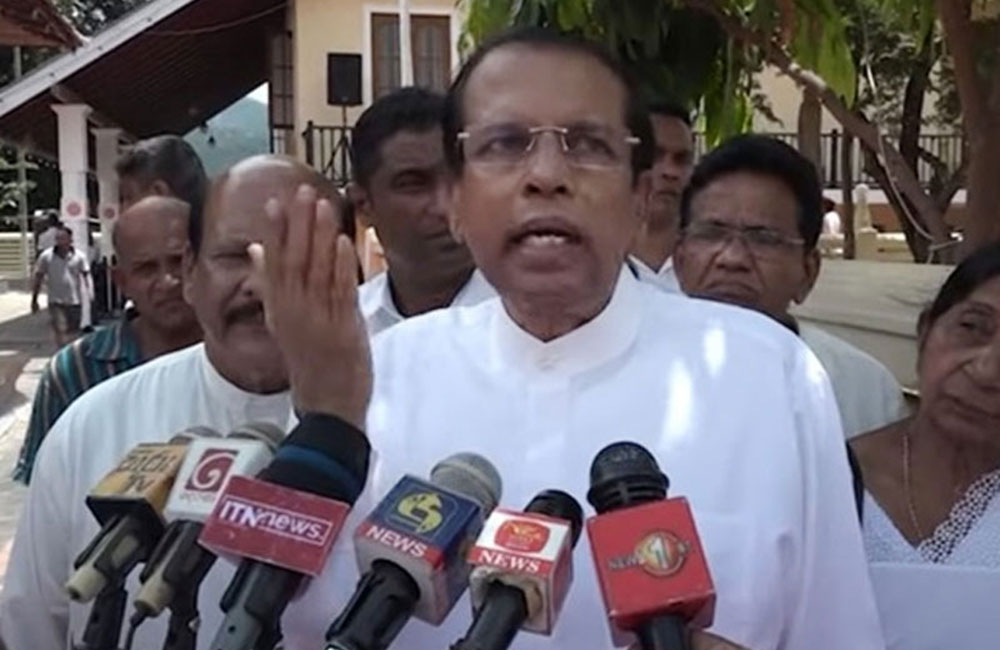
Maithri says he knows who carried out the Easter Attacks
Former President Maithripala Sirisena has claimed he knows who really carried out the 2019 Easter Sunday attacks and that he was prepared to disclose the information to the judiciary.
Speaking to the media in Kandy today, the former President said if the court makes a request or issues an order in this regard, the information will be revealed.
Stating that no one has revealed the true mastermind of the Easter attacks yet, Sirisena said he was willing to disclose the details, but it was the responsibility of the judges to keep the information strictly confidential.
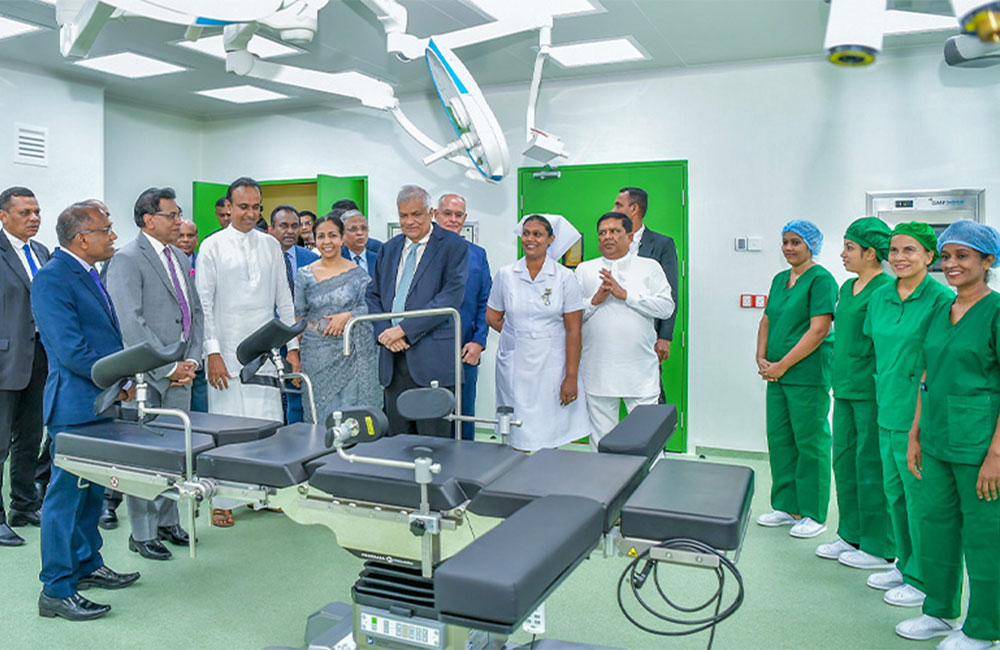
President Inaugurates South Asia’s Largest Maternity Hospital
President Ranil Wickremesinghe emphasized that the future of the country hinges on modernizing the education and health sectors to align with forthcoming challenges and opportunities.
President Ranil Wickremesinghe stressed the imperative of modernizing the education and health sectors to ensure the country’s future prosperity and development.
The President highlighted a significant shortfall in capital expenditure for education and health over the past three and a half decades. It is now planned to increase capital expenditure in these sectors starting from this year.
President Ranil Wickremesinghe made this remark while attending the inauguration of the “German-Sri Lanka Friendship New Women’s Hospital” in Karapitiya Galle, hailed as the largest maternity hospital in South Asia, earlier today (27).
The six-story hospital claims 640 beds, 6 operating theatres, emergency treatment units, intensive care units, laboratories, infant intensive care units, special paediatric units, and state-of-the-art medical facilities. Additionally, it features water purification and recycling unit.
The German government has contributed Euro 25 million (LKR 3570 million) in this project, in addition to providing medical equipment.
Initially, eight hundred perches were allocated for the hospital’s construction, but later, two additional plots of land were acquired, increasing the total area of the hospital to nearly one thousand perches.
Former Chancellor of Germany, Helmut Kohl, made this significant donation towards the construction of a new maternity hospital in Sri Lanka. This gesture came after witnessing the devastation caused by the tsunami to Mahmodara Hospital Galle, the largest maternity hospital in the southern province, during his vacation in December 2004 at a tourist hotel in Talpe, Habaraduwa.
Following the inauguration of the new hospital, plans are underway to relocate the Mahmodara Maternity Hospital from its current location.
President Ranil Wickremesinghe also visited the newly opened maternity hospital to inspect its facilities, including the state-of-the-art surgery rooms.
President Wickremesinghe expressed gratitude by presenting a memento to the German Ambassador to Sri Lanka, Dr. Felix Neumann, in appreciation of the generous donation received from the German government.
During his address at the ceremony, President Ranil Wickremesinghe highlighted the shift in healthcare challenges over time.
“Previously, our medical professionals battled against diseases like malaria. However, with the rise in the elderly population and the emergence of various health issues, the complexities in the healthcare sector have escalated. Hence, it is imperative to adapt and transform our healthcare services to meet these evolving challenges effectively.
Furthermore, the education system in our nation necessitates a significant overhaul. Historically, the allocation of capital funds for education and healthcare has been limited. During that period, these sectors did not receive sufficient financial support, primarily due to the substantial allocation of funds towards wartime efforts. Additionally, a considerable portion of our budget has been directed towards servicing hefty loans and paying off interest.
During my tenure as the Minister of Education from 1980 to 1989, efforts were made to increase funding for education. However, various circumstances hindered our ability to allocate more resources to this sector subsequently. Moving forward, it is imperative that we prioritize increased investment in education for the betterment of our nation.
Due to extensive borrowing last season, a staggering 50% of our income is now allocated towards debt and interest payments. Although over 7 trillion was earmarked for this year’s budget, a significant portion, totalling 3.9 trillion, must be directed towards debt repayment. Of this amount, one-third is dedicated to loan settlement, while the remaining two-thirds are allocated for interest payments. Additionally, approximately 1.2 trillion is allocated for salaries. After accounting for recurring expenses, there is very little remaining for essential activities such as irrigation.
As a nation, we cannot sustain this current situation. Recognizing this urgency, the International Monetary Fund (IMF), the World Bank (WB), and the Asian Development Bank (ADB) have advised us to initiate immediate restructuring measures. Our first step towards achieving economic stability involves generating the necessary funds for this year’s expenditure domestically. Printing money or seeking funds from state banks are not viable options at this time. Therefore, we must focus on earning the required income internally to progress forward.
Implementing tax hikes was the sole viable option, despite facing widespread criticism. However, this measure eliminated the need to print money for the budget for the first time. We acknowledge the hardships endured by all, yet the tax increase spared us from budgetary loans. The impact is evident nationwide today. The rupee, once valued at 370 against the dollar, has now strengthened to 300. This trend is anticipated to continue, further bolstering the rupee’s value in the future.
The decrease in inflation has facilitated a reduction in interest rates, which in turn is expected to stimulate business growth. As the business sector flourishes, so does the nation’s development. Despite the challenges faced, today the country reaps the benefits of the implemented measures. Additionally, efforts were made to augment salaries in the public sector and furthermore, we endeavoured to triple the number of ‘Aswesuma’ beneficiaries and expand the scope of coverage. Corresponding initiatives were also undertaken to boost salaries in the private sector. By adhering to this program, the loan repayment burden is anticipated to diminish gradually over the next two years, freeing up resources for national development endeavours.
The future holds no promise without innovation in education and healthcare. Our strides in the 1930s and 80s were fuelled by advancements in these sectors. Presently, the robustness of our healthcare system, both locally and even in the United Kingdom is a testament to our medical services. Hence, I affirm that by securing adequate funding for healthcare and education, we will foster rapid progress in these domains.

234 acres of land in Jaffna released to farmers under ‘Urumaya’
President Ranil Wickremesinghe today (22) released as many as 234 acres of land, previously held by the Jaffna Security Forces Headquarters, to farmers in the area.
These plots of land were released to farmers across five Grama Niladhari Divisions in Jaffna for cultivation purposes, the President’s Media Division said.
Under the Urumaya national program, aimed at distributing 2 million freehold deeds to the deserving public, President Ranil Wickremesinghe symbolically presented the deeds, benefiting a total of 408 individuals at a ceremony held in Oddakapulam, Jaffna.

President Wickremesinghe pledges Digital Transformation for Poverty Reduction and Educational Reform
President Ranil Wickremesinghe highlighted Sri Lanka’s commitment to agricultural modernization and emphasized the nation’s goal of reducing multi-dimensional poverty. By 2035, Sri Lanka aims to ensure that multi-dimensional poverty does not exceed 10%. While achieving zero poverty is unprecedented, the President acknowledged that even leading countries typically operate with a poverty rate around 7%.
To achieve this ambitious target, President Wickremesinghe stressed the importance of establishing a robust framework and gathering accurate data. This data will help identify individuals and areas most in need of assistance, considering various dimensions such as education, health, and income levels at the grassroots level. President Wickremesinghe emphasized that addressing multi-dimensional poverty is a crucial tool alongside efforts to enhance the education system.
President Wickremesinghe made these remarks while delivering the keynote speech at the Digital Public Infrastructure (DPI) Seminar today (26), at Taj Samudra Hotel, Colombo emphasizing the timeliness of the Seminar amid Sri Lanka’s shift beyond economic stabilization. Highlighting the achievement of stabilizing the economy and on-going negotiations with international creditors, President Wickremesinghe outlined the government’s economic transformation agenda.
This seminar on Digital Public Infrastructure co-organized by the High Commission of India in Colombo and the Ministry of Technology, Government of Sri Lanka, to explore the transformative potential of DPI for enabling service delivery, empowering communities by fostering inclusivity and enriching the economy by driving innovation.
President Wickremesinghe also expressed his intention to present the legislation to parliament by the middle of this year, at the latest, to enable the functioning of the proposed agency. He emphasized that this legislative and policy framework is crucial for Sri Lanka to become a competitive economy, especially as the Indian Ocean region emerges as a key growth area.
The President characterized Sri Lanka’s economy as a “patchwork economy,” describing it as a collection of disparate elements stitched together. He emphasized the need to transition towards a more cohesive digital economy.
Acknowledging the importance of digitalization, President Wickremesinghe highlighted the significance of discussions on the digital public economy. He outlined plans to establish a new institutional framework to facilitate this transition, moving away from existing structures like IT councils and focusing on creating a Digital Transformation Agency and an AI centre, allocated with a budget of LKR 01 billion. This agency would be dedicated to building a robust digital economy, departing from previous approaches that failed to yield desired outcomes.
He underscored the importance of digital infrastructure in modernizing agriculture, addressing multi-dimensional poverty, and reforming the education system.
The President stressed the importance of reinforcing the education system, both at the school and higher education levels, to support this initiative. One of the key decisions is to introduce Artificial Iintelligence (AI) into schools within the next five years, with the goal of integrating it into every school within five to eight years, extending to universities as well.
President Wickremesinghe expressed gratitude to the Indian government for their support, in advancing Sri Lanka’s digital economy, highlighting plans to collaborate with Indian institutions and leverage their expertise, particularly in establishing a campus of the Chennai Indian Institute of Technology (IIT) and additionally planning to launch three universities, two of which will focus on technology.
He highlighted the significance of India’s technological advancements and proposed leveraging their expertise to expedite Sri Lanka’s development by adopting suitable strategies. President Wickremesinghe underscored the need for collective support to implement these plans and emphasized the urgency of embracing modernization to propel Sri Lanka into the 21st century.
The President concluded by expressing optimism that the discussions at the workshop would contribute significantly to the nation’s development plans and programs.
Meanwhile speaking at the event State Minister of Technology Kanaka Herath outlined Sri Lanka’s commitment to operationalizing the DIGIECON 2030 roadmap, focusing on upgrading networks and promoting Digital Financial Services (DFS) for financial inclusion.
He further said the government aims to implement DPI across all levels to foster a connected digital government and address challenges like cyber-security.
Moreover, the State Minister announced plans for a global investment summit on June 25th, offering a platform for tech VCs. He urged investors to embrace change and contribute to the country’s digital evolution to explore investment opportunities in Sri Lanka’s burgeoning tech ecosystem.
Present at the event were Minister of Foreign Affairs Ali Sabry, Minister of Ports, Shipping, and Aviation Nimal Siripala De Silva, State Minister of Technology Kanaka Herath, Indian High Commissioner H.E. Santosh Jha, Parliamentarians Harsha De Silva, Kavinga Jayawardena, Mayantha Dissanayake, Charitha Herath, and Mohomad Muzammil. Also in attendance were Secretary to the Ministry of Technology Dr. Dharmasiri Kumaratunge and notable stakeholders from India and Sri Lanka.
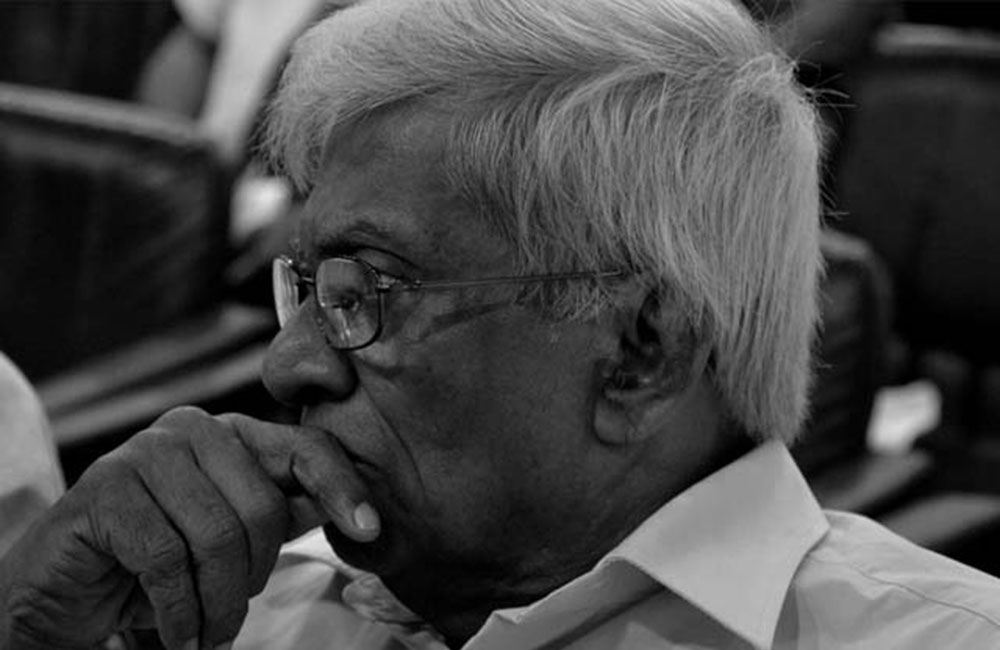
Retired Senior Prof. Chandrasiri Palliyaguru passes away
Prof. Chandrasiri Palliyaguru, retired Senior Professor and Head of the Sinhala Department at the Sri Kelaniya University has passed away.
He was 80 years old.
Prof. Palliyaguru, entered the Vidyalankara University in 1961, studied Sinhala, Pali, and Hindi and graduated in 1965 by offering Sinhala as his major and Hindi as his subsidiary.
He earned his Ph.D. in Cultural Anthropology in 1976 for his thesis titled 'A Proposed Classification of Contemporary Sinhalese Rituals with Specific Reference to the Southern Province of Sri Lanka'.
In 2013 (Hon.) he was conferred with the title of Professor Emeritus by the University of Kelaniya as well.
He is the author of several books.
(sundaytimes.lk)
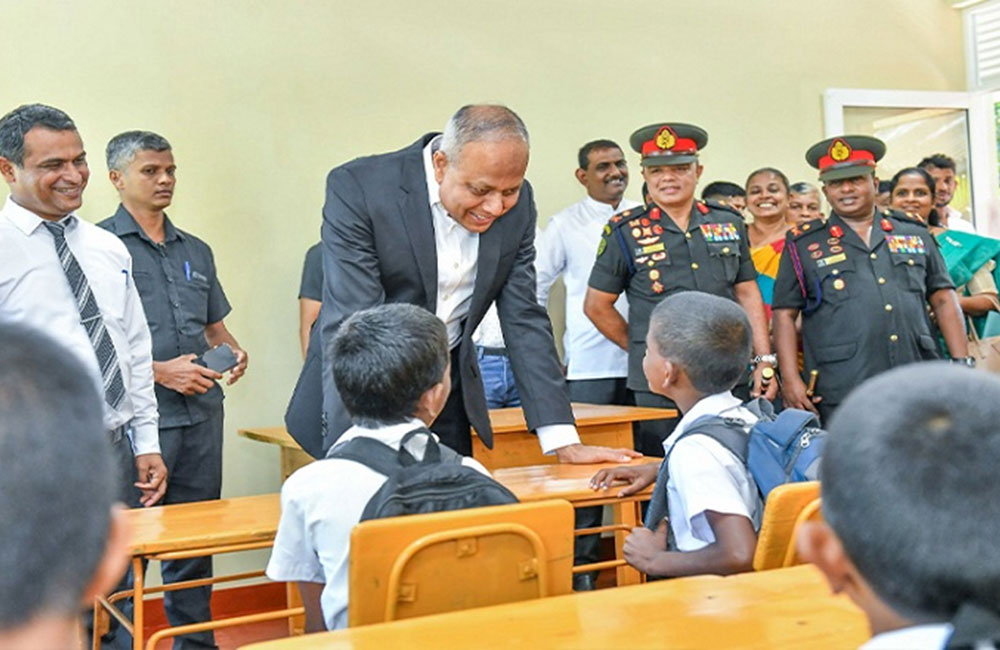
“Successful Education System Crucial for Country’s Development” – Mr. Sagala Ratnayaka
Mr. Sagala Ratnayaka, Senior Advisor to the President on National Security and Chief of Presidential Staff stated that for a country to progress towards development, it must implement a successful education system.
He emphasized that regardless of the number of educational reforms implemented, their benefits would be limited if human resources are not managed effectively.
Mr. Sagala Ratnayaka shared these thoughts yesterday (25), during the ceremony where the newly constructed two-storey building was handed over to the students of Ilukpitiya Kanishta Vidyalaya in Kotapola, Matara.
The newly constructed building of the Ilukpitiya Kanishta Vidyalaya in Kotapola, Matara, was funded entirely by the 1981 group of the Royal College Union, Colombo with the support of the 12 Engineer Services Regiment troops.
During his visit to the school, Mr. Sagala Ratnayaka received a warm welcome from the students.
Additionally, various aesthetic events created by the students were showcased, highlighting their artistic talents.
Further elaborating his remarks, Mr. Sagala Ratnayaka stated,
The construction of this two-storey building was completed in just six months, marking a significant transformation in both the physical infrastructure and educational opportunities at the school. The dedication of the principal to these initiatives is noteworthy, and the substantial contribution of the Sri Lanka Army in constructing the building is highly appreciated.
The importance of a successful education system in driving a country towards development cannot be overstated. Without such a system in place, a nation’s success is compromised. While creating educational programs is accessible to many, the key lies in effectively managing human resources to implement these programs. Reflecting on past challenges, such as economic collapse and fuel shortages, underscores the necessity of proactive leadership. President Ranil Wickremesinghe, assuming leadership during a critical period, spearheaded efforts to rescue the country from economic turmoil. His collaboration with the International Monetary Fund (IMF) and diligent work significantly contributed to improving the country’s economic status.
A new program aimed at ushering in transformative economic changes in Sri Lanka is deemed necessary. To achieve this, the President has initiated a series of reforms. One significant step is making the Central Bank of Sri Lanka an independent institution, which is now accountable to both the nation and its citizens. Moreover, every institution is expected to uphold accountability to the country and its people, with relevant laws already drafted. These legal measures will empower authorities to take legal action against institutional heads who fail to meet these responsibilities.
Furthermore, an economic initiative has been established to foster the development of every province in the country.
Tailored plans have been devised to boost the economy of each province using region-specific methods. Deniyaya, in particular, holds a significant role in the nation’s economic growth. It is noteworthy that Deniyaya has abundant opportunities in industries like tea plantations and tourism. Consequently, efforts are underway to create a condutive environment in which the residents of Deniyaya can earn an income that matches their expenses.
The Commander of the Army, Lieutenant General Vikum Liyanage, along with senior officers, members of the Colombo Royal College Union including Mr. Amanda Weerasinghe, a senior member of the 1981 group, the Principal of Ilukpitiya Kanishta Vidyalaya, Mr. Lakmal, teachers, parents, and students were present at the event.

No-confidence motion against Speaker defeated in Parliament
The vote on the no-confidence motion against Speaker of the Parliament Mahinda Yapa Abeywardena, was defeated in the Parliament today (21), following a three-day debate.
The Speaker survived the no-confidence motion, moved by the Samagi Jana Balawegaya (SJB), by a majority of 42 votes.
A total of 117 lawmakers had voted against the motion while 75 voted in favour.
Accordingly, Mahinda Yapa Abeywardena will continue to function as the Speaker of the Parliament of Sri Lanka.
The third day of the parliamentary debate on the no-confidence motion against the Speaker commenced at 09.30 a.m. this morning.
The parliamentary debate on the no-confidence motion tabled by the Samagi Jana Balawegaya (SJB) was initially slated to be held for two days, however the Committee on Parliamentary Business later decided for it to be debated for three consecutive days.
The debate commenced in the Parliament on Tuesday (March 19).
The motion brought forth by the opposition against the Speaker was officially handed over to the Deputy General Secretary of Parliament on March 05.
It had been signed by 44 parliamentarians including Opposition Leader Sajith Premadasa, Chief Opposition Whip Lakshman Kiriella and MPs Prof. G.L. Peiris, Rohini Kumari Wijeratne, Hesha Vithanage, Mano Ganesan, Rishad Bathiudeen, M.A. Sumanthiran, S.M. Marikkar, Ranjith Madduma Bandara, Thalatha Atukorale, Vijitha Herath and Chandima Weerakkody.
The no-confidence motion alleges that the Speaker had ignored the Supreme Court’s recommendations pertaining to Sections 13, 17, 20, 33 (6), 34 (1), 35 (1), 21, 22 and 33 of the Online Safety Bill.
The Speaker is also accused of allowing the third Reading of the Online Safety Bill to be passed without a vote and disregarding the Chief Opposition Whip’s call for a division at the Committee Stage.
Further, the opposition MPs claim that the Speaker had ‘unconstitutionally and unlawfully’ used his decisive vote to affirm the appointment of IGP Deshabandu Tennakoon when the other members of the Constitutional Council were divided on a tie on the matter. It was reported that four members had voted in favour of the appointment while 2 voted against and 2 others abstained. However, considering the 2 abstentions as votes cast against, the Speaker had used his vote as the deciding vote to go ahead with the appointment, they allege.
(adaderana.lk)

Management of Expressways in Sri Lanka : New decision
The daily operations and management of Sri Lanka’s expressways, which are currently handled by the Road Development Authority (RDA), are to be vested with Sahasya Investment Limited this year.
Cabinet approval has been granted for the proposal put forth in this regard by the Minister of Transport and Highways Bandula Guanwardena.
Accordingly, the operations and management of Sri Lanka’s expressways will be vested with Sahasya Investment Limited with effect from April 01, 2024.
The transfer is to be carried out as per a formal management agreement between the RDA and Sahasya Investments Limited.
Meanwhile, the transfer of all the relevant assets to Sasahasya Investments Limited is to take place within six months consequent to a legal and financial feasibility study jointly conducted by the two parties.
Cabinet Decision :
In the Cabinet meeting held on 26.06.2023, approval was granted for the shifting of the expressway network from the Road Development Authority (RDA) to Sahasya Investment Limited so that the land owned by highways, highway loans and related staff can be managed more commercially. The respective action plan was approved in the Cabinet meeting held on 05.02.2024. Accordingly, the Cabinet of Ministers approved the proposal presented by the Minister of Transport and Highways to shift the daily operations and management of expressways to Sahasya Investment Limited from 01.04.2024 per a formal management agreement and to transfer all the relevant assets to Sasahasya Investments Limited within six months consequent to a legal and financial feasibility study jointly conducted by the RDA and Sahasya Investments Limited.
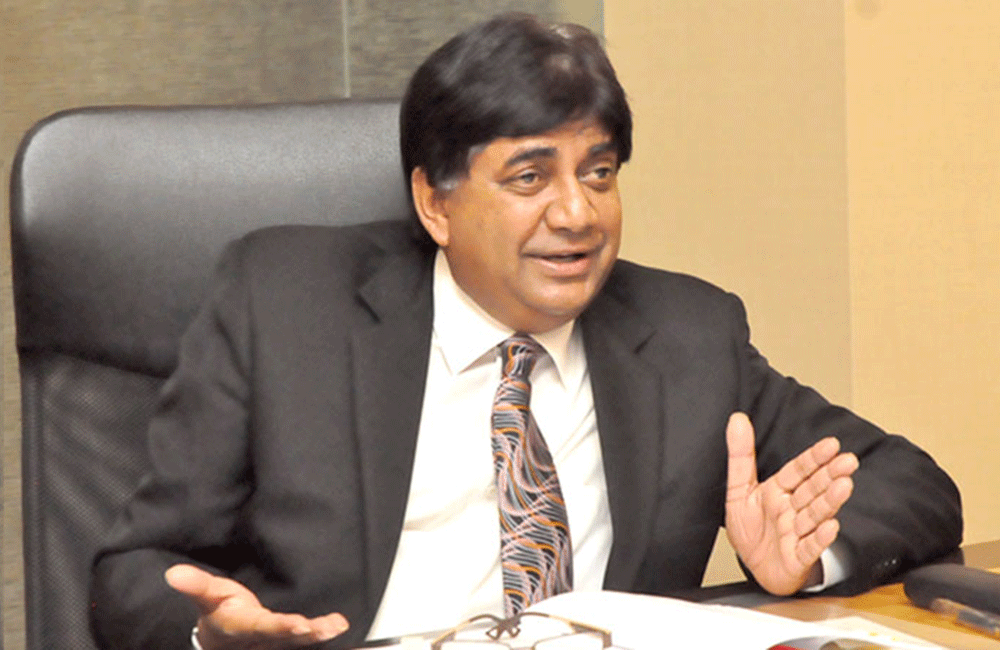
Dilan Perera also resigns from COPE
MP Dilan Perera has also decided to resign from the Committee on Public Enterprises (COPE), becoming the 11th member to do so.
Earlier, Eran Wickramaratne, Gamini Waleboda, Prof. Charitha Herath, Dayasiri Jayasekara, S. M. Marikkar, Hesha Withanage, Shanakiyan Rasamanickam, Wasantha Yapa Bandara, Anura Kumara Dissanayake and Duminda Dissanayake had quit the committee membership, to remonstrate the appointment of new COPE chairman.
At the first COPE meeting of the Fifth Session of the Ninth Parliament convened on March 07, Rohitha Abeygunawardena was elected by majority votes to serve as the new chairman. His name had been nominated by MP Mahindananda Aluthgamage and seconded by MP Sanjeewa Edirimanna.
Meanwhile, the first COPE meeting under the chairmanship of Abeygunawardana was convened at the parliament complex on Tuesday (March 19) despite the string of member resignations.
(adaderana.lk)
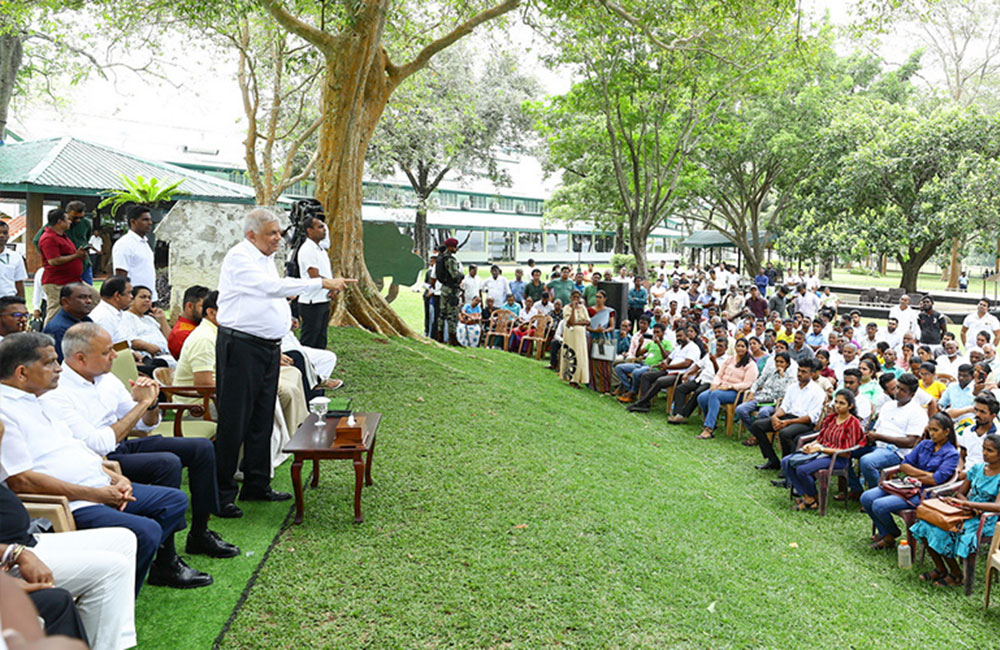
Export-oriented economy by 2035 : President reveals plans
President Ranil Wickremesinghe emphasizes the necessity of a new economic reform program for the country’s economic recovery. He urges collective support from all citizens to prevent the next generation from inheriting the hardships of past economic crises.
The President reminisced about inheriting a country others were reluctant to lead, highlighting that while some focused on their political aspirations, his concerns were committed towards the welfare of the nation’s future.
President Ranil Wickremesinghe made these remarks while participating in a friendly discussion organized by the ‘United Youth Union’ on the theme ‘Future of our Youth’. The event took place yesterday (23) in Polonnaruwa.
During the ‘Conversation with the President’ meeting, President Ranil Wickremesinghe engaged in discussions with the youth, focusing on the future and vision of the country. The President addressed various issues raised by the youth and provided solutions during the session.
During the event, President Ranil Wickramasinghe asserted that the populace would reap the rewards of the government’s on-going economic reform endeavours within a few years. He stressed the importance of the nation’s youth determining the trajectory towards a brighter future for both themselves and the country.
Addressing the youth, the President emphasized:
I assumed leadership of a country in decline, one that other political leaders were reluctant to govern. Contemplating the consequences had I not stepped in, I recognized the stakes were high. While some feared the impact on their political careers, I considered the dire prospect of the country’s demise if immediate action wasn’t taken.
My sole challenge was my solitary presence in Parliament. However, around December, I engaged in discussions with the Managing Director of the International Monetary Fund (IMF) and the World Bank (WB). Subsequently, I briefed the former President on these discussions and urged him to implement the proposed program.
In the previous election, the United National Party declared the country’s financial deficit, emphasizing the urgent need to secure at least US$ 03 billion. Despite our efforts, this candid disclosure did not resonate with voters. However, the accuracy of this statement became evident in 2021.
Assuming leadership amidst such dire circumstances, I pondered the repercussions had I not stepped in. The nation’s economy teetered on the brink of collapse, necessitating immediate action. We diligently pursued support from the IMF to revive the ailing economy. Successfully concluding negotiations with the IMF, we are now poised to engage with the countries from which we have borrowed, seeking further assistance to stabilize our financial footing.
Following these discussions, our country’s development initiatives will receive renewed support from these nations. However, it is crucial to acknowledge that this alone does not address all our challenges. Persistently operating as an import-dependent economy, where imports surpass exports annually necessitates borrowing to bridge this gap. Without rectifying this structural imbalance our economy risks collapsing again within the next decade.
It is incumbent upon each of us to prevent the transmission of this economic crisis to the next generation. I firmly believe that this responsibility rests upon all our shoulders, necessitating our full dedication. Urgent economic restructuring is imperative, transitioning from an import-dependent to an export-driven economy. This requires comprehensive economic development across urban and rural areas alike, coupled with stringent budgetary controls. By implementing these governmental reforms, we can envisage a shift to an export-oriented economy by 2035, paving the way for sustained economic growth thereafter.
Furthermore, the government aims to double the annual tourist arrivals to Sri Lanka from 2.5 million to 5 million. Efforts will also be made to attract high-spending tourists to the country.
Additionally, we are dedicated to rural development through an agricultural modernization initiative. This initiative aims to facilitate agricultural exports by enhancing rural infrastructure. We are introducing new crop varieties and collaborating with the Thai government to explore ‘Durian’ cultivation opportunities. By increasing crop productivity, we envisage substantial improvements in the rural economy.
With abundant solar and wind resources in our country, transitioning to wind and solar energy production could yield tenfold the required energy, with surplus electricity exportable to India. Moreover, a thousand-acre investment zone in Trincomalee is underway, supported by India. Plans also include the development of the Mahaweli A and B zones to establish modern agricultural practices.
Efforts have been underway to establish new investment zones in Bingiriya and the North, with the requisite land already earmarked for this purpose. These initiatives are slated for implementation within the next five years.
I am undertaking all these endeavours for the betterment of your future. It should be emphasized that these efforts are ultimately for the benefit and prosperity of your children.
Additionally, efforts have been directed towards the development of the Higurakgoda area, with funding allocated this year for the construction of Higurakgoda Airport. This initiative will expand air services to the province. Furthermore, the historic town of Polonnaruwa can be made accessible to tourists both day and night. By integrating cultural elements with modern dances and songs, we have the potential to organize diverse tourism programs. It is imperative that we advance with these initiatives.
Henceforth, it is imperative for the youth to chart the course for the nation’s future. You hold the reins to your destiny. Within our political landscape, there exists a faction advocating quick fixes akin to “oil medicine.” However, the issues confronting our nation cannot be remedied with such temporary solutions. Therefore, I urge you to exercise caution and foresight as you navigate towards the future.
The questions posed by the youth and the responses provided by President Ranil Wickremesinghe are outlined below:
Q:
We have a significant expanse of paddy fields within the Lankapura Gramaseva Division, with some of these fields under the jurisdiction of the Wildlife Department. We kindly request your consideration to allocate these fields once again for cultivation purposes.
A:
As per the 1985 map, there are lands designated under the purview of the Department of Wildlife, as well as lands allotted to villages. We seek to thoroughly review this information and proceed with necessary actions accordingly.
Q:
As youth, we hold great admiration for you. In our region, there is potential to generate revenue in dollars. We believe that showcasing the wild elephants that frequent our villages could attract foreign visitors and enable us to earn foreign currency. Therefore, we request your support in providing us with training opportunities, enabling us to contribute to the country’s revenue while securing our own income.
A:
Tourism in our country is currently making significant strides forward. Furthermore, a committee has been tasked with the promotion of tourism. Therefore, I would like to assure you that solutions will be forthcoming in the near future
Q:
We reside in a remote village located in the Welikanda area. We kindly appeal to you to allocate land for us to engage in cultivation activities utilizing modern technology as part of the government’s agricultural modernization project.
A:
In 1977, the Welikanda area was predominantly covered by dense forest. Today, Welikanda and Maduru Oya have evolved into highly conducive provinces for agriculture. We have devised plans to introduce modern agricultural practices to the village under the Agricultural Modernization Project. Additionally, we have initiated a program to distribute free land deeds to the residents, with the aim of completing it within two months, granting legal land rights to 02 million people. Furthermore, we aspire to boost the tourism industry in this area and encourage agricultural cultivation as part of the agricultural modernization program.
Q:
Dimbulagala holds a distinctive position within the tourism industry. I recommend that special attention be directed towards its development.
A:
With the assistance of the International Monetary Fund program, there is now an opportunity to execute the country’s development initiatives. Consequently, the government has prioritized the promotion of tourism and is aiming to boost tourist arrivals. Additionally, efforts are underway to elevate tourism revenue to LKR 5.5 million. It is noteworthy that the government is concentrating on the development of all regions as potential tourist attractions.
Q:
President, I am a law student. In 1989, Janatha Vimukti Peramuna (JVP) killed six members of my family in a single day and looted property worth LKR 08 million. Their bodies were not even allowed to be buried in the cemetery. We still live in fear due to the remnants of JVP.
As a member of the affected family, I have been unfairly deprived of my shop on the main street owned by the Higurakgoda Provincial Council as an act of political revenge, hindering my ability to conduct business. For three decades, many young individuals like me have endured such political reprisals, depriving us of rightful opportunities. I am curious if you have any plans to address this issue.
A:
We are prepared to address your concerns. Best wishes with your studies.
The event was attended by Senior Advisor to the President on National Security and Chief of Presidential Staff Sagala Ratnayaka, former Deputy Minister Chandrasiri Suriyarachchi, SLPP Organizer of Minneriya Jagath Samarawickrama, Chairman of the United Youth Advisory Board Sudath Chandrasekera, its Director General Prasad Asanka Ratnayake, National Organizer Vijith Anuradha, and a significant number of youth representing the Polonnaruwa district.

AKD heads to Canada
The leader of the National People’s Power (NPP) Anura Kumara Dissanayake left for Canada today (21) for a visit.
Dissanayake is scheduled to participate in two major rallies organized by the Canadian Committee of the NPP on March 23 in Toronto and on March 24 in Vancouver.
He will also participate in several friendly meetings with the Sri Lankan Tamil and Muslim communities in Canada.
Page 42 of 510